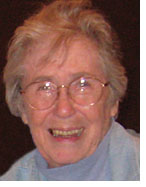 I am very happy to post this guest essay by the highly successful writer Laverne Daley, thirty-year veteran of corporate copywriting and freelance journalism:
I am very happy to post this guest essay by the highly successful writer Laverne Daley, thirty-year veteran of corporate copywriting and freelance journalism:
The notion of grammar and humor first struck me when I was writing an earlier post on my site (Precision in Writing – Is That Word Necessary?) in which I mentioned dangling participles.
Now I admit that grammar and humor are an unlikely pairing, but put a dangling participle into the mix, and you might encounter a bit of humor — not enough for guffaws or chuckles, but maybe enough for a quiet smile when you recognize the humor that is there — although probably not intended by the writer.
In that earlier post, I included two dangling participles that Evan Marshall mentioned in his book, The Marshall Plan for Novel Writing (Leaving the village, the mountains glowed red in the sun) and (Opening the closet door, the cat sprang from the shadows), along with Marshall’s comment, “These statements give the mountains and the cat undue credit.”
Numerous dangling participles turned up when I went searching for more. Some were on college web sites, in instructors’ class notes advising students how to avoid the danglers, in Strunk and White’s The Elements of Style, and on blogs and web sites pointing out how they can cause serious misunderstandings.
Some examples:
“Running through the neighborhood last Saturday afternoon, his nose detected the delectable aroma of barbecued steak on someone’s backyard grill.” (College of Siskiyous)
“Rushing to finish the paper, Bob’s printer broke.” (Guide to Grammar and Style, Jack Lynch).
“Driving home in yesterday’s storm, a tree fell on the back of my car.” (www.papersbyjoantaber.blogspot.com)
“Hanging by their tails from the branches, the children watched the monkeys.” (College of Siskiyous)
“I saw the trailer peeking through the window.” (The Elements of Style)
“The man with the bushy mustache carrying a briefcase went into the police station.” (www.associatedcontent.com)
“Walking home last night, a banana fell on my head.” (ScribblesandWords.com)
It’s easy to see how dangling participles can distort your meaning and leave your reader wondering what you’re trying to say. Readers may not actually believe that somebody’s nose was running through the neighborhood or that a tree was driving a car during last night’s storm, but those thoughts will certainly divert them from what you really are trying to say.
Consider the words of Angela Harms, editor of “Don’t Dangle Your Participle” (www.WritersResources.com):
“Even when dangling participles don’t cause confusion and they aren’t silly, these critters should be avoided. They are stumbling blocks. Your readers may understand well enough, but they will have to pause, if for only a fraction of a second, while their brains process the strange construction.”
Whatever humor we may find in the dangling participles of other writers, we certainly don’t want editors and readers to find them in our own work. To fix a dangling participle, move the offending participle so it follows what it actually describes (The children watched the monkeys hanging by their tails from the branches) (While peeking through the window, I saw the trailer).
Dangling participles happen because the first part of a sentence and the clause that follows don’t belong together and don’t make sense. When editing your work, watch for sentences containing “—ing” and especially watch for sentences beginning with “When —ing”. Then zap those dangling participles before they give readers and editors the giggles.
© 2008 by Laverne Daley
Laverne Daley is a Memphis-based freelancer whose work has appeared in AdWeek, Photo District News, Momentum, Children’s Playmate and scores of other national, regional and local publications. This former business newspaper reporter and university magazine editor has also provided copywriting and editing services for corporate clients in several states. You can visit her writing-related blog, Words into Print, at http://ldaley.wordpress.com.
